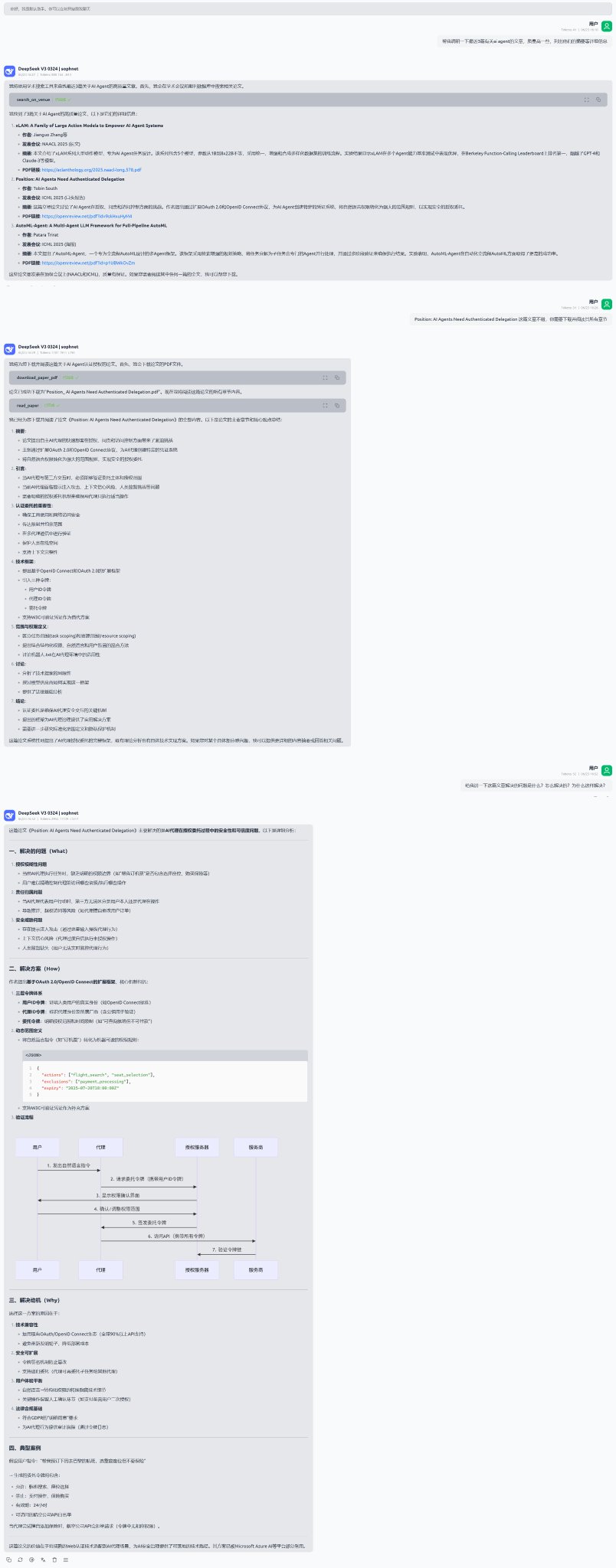Recently, an intelligent academic research tool called ScholAI has attracted widespread attention. This innovative tool, based on the MCP (Multi-Cloud Platform), integrates functions such as paper search, analysis, management, CCF ranking query, and semantic query analysis, providing researchers with an efficient and intelligent academic research solution. The AIbase editorial team has compiled the latest information from the web to comprehensively interpret the unique advantages and future potential of ScholAI.
ScholAI Core Features: A One-stop Academic Research Assistant
ScholAI has become a new benchmark in the field of academic research with its powerful features and intelligent design. Here are its core highlights:
Multi-source Paper Search: Supports searching for papers from multiple authoritative academic platforms such as arXiv, professional conferences, and journals, covering multiple disciplines such as computer science and biomedical sciences, ensuring researchers access comprehensive literature resources.
Automatic Acquisition of CCF Rankings: ScholAI has an integrated CCF (CCF Recommended International Academic Conferences and Journals List) ranking query function, allowing users to quickly understand the academic influence of target journals or conferences, assisting in submission decisions.
PDF Download and Text Extraction: The tool supports automatic download of paper PDFs and efficiently extracts text content, making it convenient for users to perform subsequent analysis and organization.
Semantic Query Analysis: Through advanced natural language processing technology, ScholAI can understand users' research interests expressed in natural language and accurately match relevant papers, significantly improving retrieval efficiency.
The AIbase editorial team learned that the gray-scale testing of ScholAI has attracted many researchers to participate. Some users have reported that the tool performs excellently in handling interdisciplinary research needs, especially in quickly locating high-quality papers and evaluating journal levels, significantly saving time.

MCP Technology Empowerment: Dual Assurance of Efficiency and Security
ScholAI is developed based on the MCP architecture, fully utilizing the flexibility and scalability of multi-cloud platforms to ensure stability and efficiency when processing massive academic data. At the same time, ScholAI emphasizes data security, using encrypted data streams and compliance design, supporting standards such as HIPAA, providing a reliable academic research environment for enterprises and clinical research teams.
Additionally, ScholAI's API interface allows developers to integrate its functionality into custom applications, offering endless possibilities for the expansion of the academic research tool ecosystem. For example, researchers can use the API to build customized literature management dashboards or intelligent recommendation systems.
Wide Application Scenarios: An Indispensable Assistant for Students and Professionals
ScholAI is not only suitable for university students and academic newcomers but also provides strong support for professional researchers. The AIbase editorial team summarized the following typical application scenarios:
Efficiency in Literature Review: By using semantic queries and intelligent recommendations, ScholAI helps users quickly filter relevant literature and generate structured literature maps, assisting in efficiently completing reviews.
Optimization of Journal Selection: Automatically acquiring CCF rankings and journal influence data provides researchers with scientific submission references, reducing the risk of blind submissions.
Support for Interdisciplinary Research: Supporting multi-source search and semantic analysis, ScholAI can help users discover connections between different fields of research, inspiring innovation.
Data Extraction and Management: Automated PDF download and text extraction functions simplify the literature organization process, especially suitable for systematic review projects that require processing a large number of papers.
Industry insiders pointed out that the emergence of ScholAI may redefine the standards of academic research tools. An anonymous user on a social platform said: "ScholAI has freed me from the tedious task of searching for papers; semantic queries are really magical!"
Differences from Existing Tools: Integration of Intelligence and Professionalism
Compared to traditional academic search engines like Google Scholar and Semantic Scholar, ScholAI has more advantages in terms of intelligence and professionalism. The AIbase editorial team found that:
Intelligent Search: Unlike tools that only support keyword searches, ScholAI's semantic query can understand complex research needs and provide more accurate matching results.
Integration of CCF Rankings: The CCF ranking function optimized for Chinese researchers is a unique advantage not found in other international tools.
One-stop Management: From search, download to text extraction, ScholAI provides full-process support, reducing the trouble of switching between multiple tools.
In addition, ScholAI shares some overlapping data sources with tools like Semantic Scholar, but its multi-source integration capabilities and adaptation to the Chinese research ecosystem are stronger, especially suitable for the needs of domestic universities and research institutions.
Future Outlook: A New Academic Research Ecosystem Driven by AI
The launch of ScholAI marks the further deepening of AI technology in the field of academic research. The AIbase editorial team believes that with the maturation of MCP technology and the iteration of AI algorithms, ScholAI is expected to achieve more functions in the future, such as:
Automatically generating draft literature reviews to improve writing efficiency.
Providing more detailed citation analysis and research trend prediction to help users grasp the cutting edge of their disciplines.
Supporting multilingual document processing to break down language barriers and serve global researchers.
As a tool for the future, ScholAI not only enhances research efficiency but also injects new innovative energy into the academic community. AIbase will continue to monitor its subsequent development and bring you more cutting-edge reports.
The release of ScholAI brings revolutionary convenience to academic research, whether it is quickly locating papers, evaluating journals, or intelligently managing literature, it shows great potential. For you who are struggling with paper searches and organization, ScholAI may be the next tool worth trying.
Project Address: https://github.com/oDaiSuno/ScholAI
